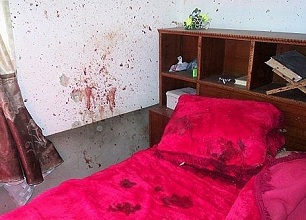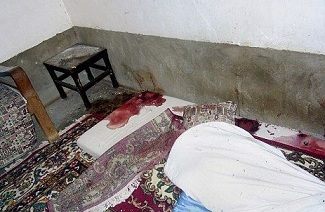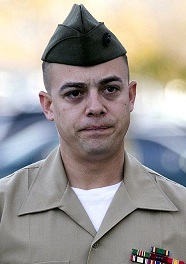No prison time for Marine charged in Haditha massacre
As part of a plea deal, Staff Sergeant Frank Wuterich, leader of a Marine squad responsible for the 2005 slaughter of 24 Iraqi civilians, will spend no time in a military prison. Wuterich, 31, pleaded guilty on January 23 to a single charge of negligent dereliction of duty for his role in the massacre in Haditha and its subsequent cover-up.
The Marine faced a sentencing hearing Tuesday at Camp Pendleton, California. Previously indicted on unpremeditated murder charges in 19 of the 24 civilian deaths, counts carrying a maximum sentence of 152 years in prison, Wuterich was allowed to walk free. He still faces possible reduction in pay and rank. During proceedings Monday, the court did not discuss a discharge for Wuterich, who has remained on active duty since the massacre.
The Haditha case was the longest running criminal prosecution against military personnel involved in the Iraq War and Wuterich was the last man among the original eight facing charges in the case. Six other Marines had charges dismissed, and one Marine was acquitted.
The plea agreement of Wuterich brings the three-and-a-half-week long court martial to a close, thereby suppressing more details about the killings, one of the worst atrocities committed by US soldiers against civilians since the My Lai massacre in Vietnam.
As in other atrocity cases related to the US occupations of Iraq and Afghanistan—among them the Abu Ghraib torture case, the Blackwater killings of Baghdad’s Nisour Square, the Afghan “kill team,” and others—the outcome of the Haditha killings absolves higher level military and government figures of any responsibility for the consequences of policies that low-ranking military personnel carry out. Like the massacre itself, the outcome of the case underscores the criminal character of the wars and the political establishment behind them.
Wuterich pleaded guilty to the minor charge of negligent dereliction of duty for ordering the squad to “shoot first and ask questions later” on the night of November 19, 2005. Although the rampage began after a convoy in which the Marines were traveling was struck by a roadside bomb, testimony of the men make clear that Wuterich and others were knowingly slaughtering innocent bystanders with no provocation.

Sergeant Sanick Dela Cruz, a young corporal at the time of the massacre, testified earlier this month that he witnessed Wuterich order four teenaged students and a taxi driver out of a passing cab, then execute them as they knelt in a position of surrender. Dela Cruz, who had been granted immunity in exchange for his testimony, said he and others riddled the victims with bullets as they lay on the ground, then urinated on their corpses. Afterward, Dela Cruz told the jury, Wuterich ordered him to lie about the killings, concocting a story involving the victims running away and coming under fire by Iraqi soldiers.
After the street shooting, Wuterich ordered the squad on a sweep of three nearby houses, where families including many women, children, and elderly residents had been sleeping. The Marines went room by room, throwing grenades and opening fire on the unarmed occupants. Nineteen civilians were killed. At no point were the Marines engaged by return fire.
Squad member Colonel Stephen Tatum had testified that in one dark bedroom, he joined Wuterich in firing upon small silhouettes. Facing the court Tuesday, however, Wuterich insisted he “never fired any weapon at any women or children that day.” He also stated that although he was entering a guilty plea, he rejected the suggestion that it was an acknowledgement of wrongdoing by his squad or the chain-of-command. “In no way should my acceptance of responsibility ever be considered an indictment of the Marines or the commanders.”
“The case doesn’t end with a bang, it ends with a whimper and a pretty weak whimper at that,” former Marine Corps prosecutor and judge Gary Solis commented to the Associated Press. “When you have 24 dead bodies and you get dereliction of duty, that’s pretty good defense work.”
The announcement of the plea deal provoked outrage and statements of condemnation from Iraqis. “This is a disgraceful sentence for an inhuman crime that lines up with the Abu Ghraib scandal and the Nisour Square massacre,” Hussein Ali, an engineer in Baghdad, told Reuters. “History will mention this sentence and will show how the Americans have a black history that disrespects human blood.”

Khalid Salman, lawyer for the victims’ families in Haditha and cousin of one of those killed in the attack, said he was in disbelief over the sentence and had to double-check the news. “This is not a traffic felony,” he said. Another Haditha resident and relative of one of the victims told Reuters, “This sentence gives us the proof, the solid proof that the Americans don’t respect human rights… This is an insult to the victims and an insult to all Iraqis.”
The outcome of the trial completes the effort of the military to tamp down the implications of the case. From the beginning, the story was presented as one of a chaotic firefight involving insurgents and an embattled Marine squad. After an outcry from relatives and witnesses, the military offered relatives settlements of $2,500 per victim.
The military regards civilian casualties as a “cost of doing business, and that the Marines need to get ‘the job done’ no matter what it takes,” a 2007 investigation into the Haditha killings by Army Major General Eldon Bargewell concluded. This perspective, codified in official military policy, found expression in widespread killings of civilians. Indeed, over the eight years of official occupation, well over a million Iraqi civilians were killed.
Documents found in an Iraqi dump, retrieved by the New York Times last month as they were being burned, bear out Bargewell’s findings. Among the papers were statements given by military personnel on the Haditha massacre. “I mean, whether it’s a result of our action or other action, you know, discovering 20 bodies, throats slit, 20 bodies, you know, beheaded, 20 bodies here, 20 bodies there,” Col. Thomas Cariker, a commander in Anbar Province told investigators, describing the scope of the carnage.
Major General Steve Johnson, who was commander of US forces in Anbar Province at the time, stated dismissively that “it happened all the time … it was just the cost of doing business on that particular engagement.” Civilians were routinely shot down at checkpoints, other officers explained, when the men stationed as guards got edgy or confused. “I had Marines shoot children in cars and deal with the Marines individually one on one about it because they have a hard time dealing with that,” one officer testified.
___________________________________________________________________________________
■ Military trial begins for Marine charged in Iraq massacre [5 January 2012]
■ Iraq Veterans Against the War director speaks on Haditha massacre [5 January 2012]
■ New revelations on 2005 Haditha massacre in Iraq [21 December 2011]
___________________________________________________________________________________
Photos: Associated Press
Article published here: http://www.wsws.org/articles/2012/jan2012/hadi-j25.shtml
URL: http://www.a-w-i-p.com/index.php/2012/01/26/no-prison-time-for-marine-charged-in-had

























